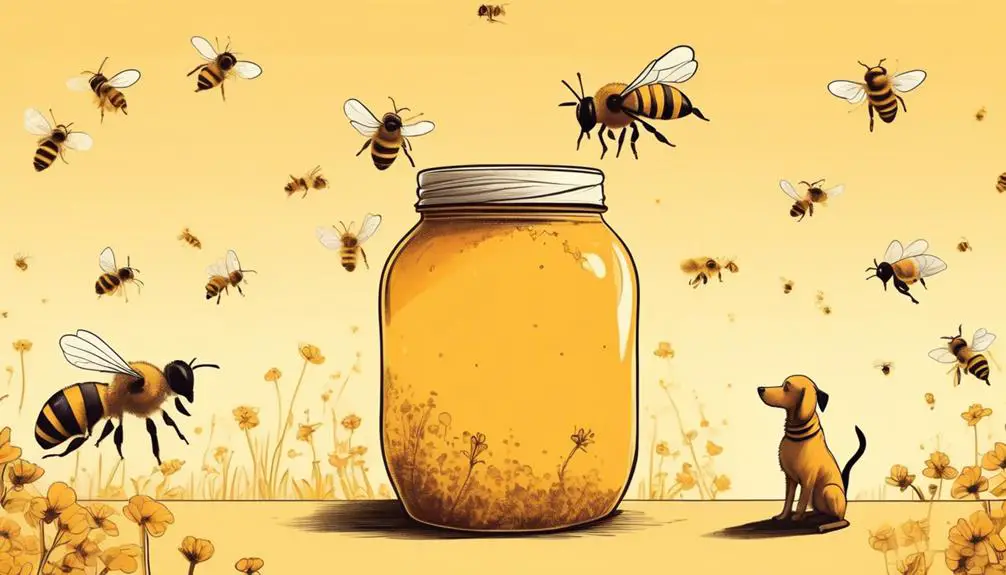Just when you thought sesame seeds and honey were harmless, discover the surprising impact they could have on your dog's health.

Are Sesame Seeds and Honey Bad for Dogs
While you might fancy the idea of your furry friend developing a taste for sesame seeds and honey, akin to some sophisticated canine food critic, it's important to understand the potential impact of these foods on your dog's health.
What if I told you that the seemingly harmless sesame seed could pose a threat? Or that the sweet allure of honey might not be as innocent as it seems for our four-legged friends? In the intricate dance of canine nutrition, it's vital to know which steps can lead to a healthy life, and which could potentially step on your pet's metaphorical toes.
So, let's unravel the mystery, shall we?
Key Takeaways
- Sesame seeds can be beneficial for dogs in moderation, providing healthy fats, proteins, and antioxidants.
- Care must be taken with sesame seeds as they can pose choking hazards and may lead to pancreatitis in large quantities.
- Check ingredient lists for foods containing sesame seeds to avoid potential harmful ingredients like chocolate or garlic.
- Honey, while rich in antioxidants and nutrients, should be given in moderation due to its high sugar content, with caution for puppies and dogs with compromised immune systems.
Understanding Canine Dietary Needs

To fully grasp why certain foods like sesame seeds and honey might affect your dog, it's crucial to understand your canine companion's dietary needs. Dogs, similar to humans, require a balanced diet to maintain their health. However, their nutritional requirements differ significantly from ours.
Protein is the cornerstone of a dog's diet. Dogs need it for the growth and maintenance of their muscles, skin, coat, and immune system. They also require a variety of minerals and vitamins, which they typically get from a well-balanced commercial dog food.
Carbohydrates are another critical component, providing energy and aiding in digestion. However, dogs don't naturally produce the enzyme amylase, which breaks down complex carbs, as much as humans do. This is why certain plant-based foods may be difficult for them to digest.
Lastly, dogs need fats for energy, absorption of fat-soluble vitamins, and maintaining healthy skin and coat. But there's a fine line between adequate and excessive fat intake, as too much can lead to obesity.
The Truth About Sesame Seeds

Despite their small size, sesame seeds pack a nutritional punch, but you may be wondering if they're safe for your dog to consume. The good news is, sesame seeds aren't toxic to dogs. They're rich in healthy fats, proteins, and antioxidants that can contribute to your dog's overall well-being. However, it's important to remember that moderation is key.
While sesame seeds aren't harmful, they're not a necessary part of a dog's diet. Dogs don't need the same nutrients humans do, and some of the fats found in sesame seeds can be hard for dogs to digest. If you're thinking of adding sesame seeds to your dog's meals, it's best to do so sparingly and preferably ground, as whole seeds can pass through their digestive system undigested.
Even though sesame seeds aren't dangerous, they can still pose a choking hazard, especially for smaller dogs. It's essential to always supervise your dog when they're eating and to provide plenty of fresh water.
Potential Dangers of Sesame Seeds

While sesame seeds aren't inherently toxic to dogs, feeding them large quantities can lead to potential health issues. The main concern is their high fat content. If your dog consumes too many sesame seeds, they may suffer from pancreatitis, a condition characterized by inflammation of the pancreas. This can result in severe abdominal pain, vomiting, and lethargy in your dog.
Another possible risk is gastrointestinal obstruction, especially if the seeds aren't properly chewed or ground. The small size and hard texture of sesame seeds can make them difficult for dogs to digest. If they accumulate in the dog's intestines, they can cause constipation or even blockage, a serious condition that requires immediate veterinary attention.
It's also worth noting that sesame seeds are often found in foods that include other ingredients harmful to dogs, such as chocolate, garlic or onions. Therefore, it's crucial that you carefully check the ingredient list before feeding your dog any food containing sesame seeds.
Honey's Impact on Dogs

You might be surprised to learn that, unlike sesame seeds, honey can have some beneficial effects on your dog's health when used in moderation. High in antioxidants and rich in vitamins A, B-complex, C, D, E, and K, honey also provides essential nutrients like potassium, calcium, and magnesium. It's excellent for treating minor cuts and burns, aiding digestion, and boosting energy levels.
However, it's crucial to remember that honey is high in sugar, so you should limit its consumption. Large amounts can lead to obesity and dental problems. Additionally, puppies and dogs with compromised immune systems should avoid honey due to the risk of botulism.
Here's a quick guide to the pros and cons of honey in your dog's diet:
Benefits | Risks |
|---|---|
High in antioxidants | High in sugar |
Rich in vitamins | Could lead to obesity |
Helps treat minor wounds | Might cause dental problems |
Aids digestion | Risk of botulism in puppies and immunocompromised dogs |
Boosts energy | Overconsumption can be harmful |
Risks and Benefits of Honey

Diving into the specifics, it's important to weigh the potential risks and benefits before incorporating honey into your dog's diet. Honey, being a natural source of sugars and antioxidants, can provide certain health benefits. It's known to help dogs with allergies, thanks to its anti-inflammatory properties. Moreover, the natural sugars can provide a quick energy boost for active dogs.
However, it's critical to remember that honey is high in sugars and should only be given in moderation. Overconsumption can lead to obesity and dental issues, not to mention the risk it poses to dogs with diabetes. Furthermore, puppies and dogs with compromised immune systems should avoid honey altogether, as it can contain bacteria and spores that they're unable to fight off.
Conclusion
In conclusion, you needn't worry excessively about sesame seeds or honey harming your dog. While sesame seeds aren't toxic, they may pose choking hazards or cause upset stomachs.
Honey, on the other hand, can benefit your dog if given in moderation. However, too much can lead to obesity or dental issues.
Always consult your vet before introducing new foods into your dog's diet to ensure their health and safety.


